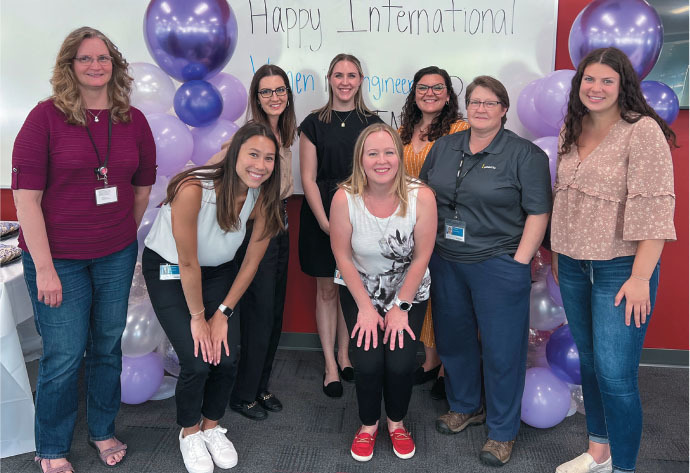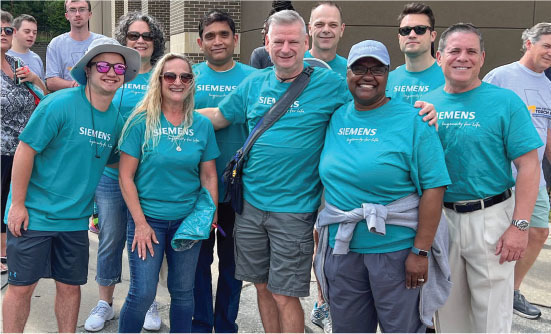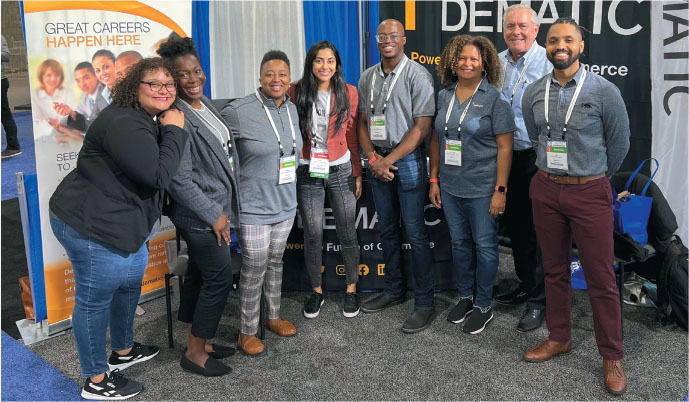DEI Feature
 BY , EXECUTIVE VICE PRESIDENT OF MEMBERSHIP AND INDUSTRY LEADERSHIP
BY , EXECUTIVE VICE PRESIDENT OF MEMBERSHIP AND INDUSTRY LEADERSHIP
Connection through commonalities is the linchpin of belonging, which is why companies seeking to foster a more inclusive business culture increasingly support the creation of employee resource groups (ERGs) among their ranks. “An employee resource group (ERG) is a supportive, inclusive network of employees who share knowledge, celebrate culture and backgrounds and build meaningful relationships across an organization,” explained Nichelle Grant, head of diversity, equity and inclusion at MHI member Siemens USA. She asserts that ERGs are essential for creating a business culture that is inherently inclusive, as these groups help employees feel a greater sense of belonging within their company.”They create a winning culture wherein all viewpoints and perspectives are respected and where every employee is invited to contribute,” said Grant. “ERGs build communities, encourage inclusive thinking among colleagues, celebrate the diversity of our workforce and offer programming that expands cultural awareness.”

In June 2022, members of DWN (Dematic Women’s Network) celebrated International Women in Engineering Day in Grand Rapids, MI.
Mercedes Barragan, diversity, equity and inclusion manager at MHI member Dematic, agreed, noting that people will always gravitate to others with whom they share something in common. “At Dematic, ERGs are formed from people who share racial, ethnic, gender and cultural attributes of diversity,” she said. “ERGs may also be rooted in other commonalities, such as military veterans, young professionals, neurodiversity, career focus or hobbies.”
Depending on the organization, ERGs may or may not have formal corporate sponsorship, added Shevon Quijano, senior manager of partnership development, global commercial strategy at Dematic. She currently serves as the co-chair of Dematic’s Black Organizational Leadership Development (BOLD) ERG.
“If your company doesn’t have formally organized ERGs, your employees are already getting together based on shared characteristics,” Quijano said. “When people join an organization, they’re looking for people to connect with, and will gravitate to those with whom they have a mutual foundation or something in common. ERGs accelerate the process of learning, growth, friendship and collaboration because you’re joined together by a mutual understanding of what it’s like to be a veteran, or an engineer, or a woman, or a caregiver, and so on.”

Nichelle Grant and a group of SiemensAbility ERG members volunteered at the Special Olympics Georgia event this summer. The Siemens team attended both the Torch Run and the Summer Games at Emory University, terrific events featuring and supporting people of all abilities.
ERGs also offer participants opportunities to grow their own skills, noted Barragan. “Not every ERG participant holds a company leadership role, but through the ERG they can develop skills outside of their job, such as being part of the steering committee or writing a communication plan, for example,” she said. “They also increase participants’ exposure to senior leadership.”
In addition to employee benefits, a company’s support of ERGs shows prospective hires its commitment to DEI initiatives. As job seekers increasingly consider not only an organization’s career opportunities but also its cultural impact, ERGs can positively impact both hiring and retention.

Members of BOLD (Black Organizational Leadership Development) from Dematic attended the NBMBAA Conference and Career Fair in Atlanta, GA in September 2022.
Turning commonalities into a common purpose
With companies prioritizing DEI initiatives, many have defined a process for launching, managing and underwriting ERGs. Most groups start out as organic, grassroots networks of employees who identify a need for an ERG focused on a particular area, said Grant. At Siemens USA, she explained, the Office of DEI encourages new ERG proposals that meet four goals:
- Supporting the career development of participants through opportunities to learn and observe something new.
- Building participants’ networks throughout the company by making global connections, as well as through mentoring and coaching.
- Sharing knowledge by providing programs, events and subject matter experts on key topics, community events, business-specific projects and more.
- Advocating for others by driving changes in policies and procedures that foster a more vibrant, inclusive workplace.
Quijano noted that many ERGs collaborate to present a discussion or other educational session on topics with intersectional interest.
“The BOLD group recently partnered with the Dematic Engineering Network to host a panel event exploring various questions around diversity within the field of engineering. It was incredibly powerful, with input and participation from throughout the company’s global locations as well,” she recalled.
“One panelist from our Monterrey, Mexico facility shared how cultural differences and misperceptions often make them feel their ideas are marginalized by American colleagues. Another attendee who is a native of a different Latin American country and had immigrated to Mexico experienced similar cultural misperceptions from Mexican peers,” Quijano continued. “This panel event created a safe, brave space to share an illuminating and empowering message about the universal importance of embracing differences and people.”
 MHI Solutions Improving Supply Chain Performance
MHI Solutions Improving Supply Chain Performance